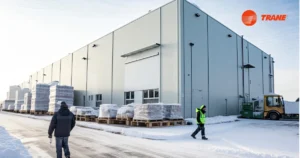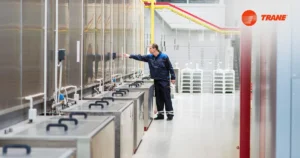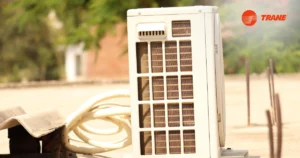Across the globe, businesses and communities are facing the dual challenge of growing energy demand and the urgent need to reduce carbon emissions. Advanced technologies are now at the center of this transition, reshaping how heating and cooling systems are designed, deployed, and maintained. Among these innovations, the heat pumps offered by Trane have become one of the most impactful solutions for organizations aiming to combine performance with sustainability.
Meeting the Global Energy Challenge
Industrial and commercial sectors remain some of the largest consumers of energy worldwide. From large-scale manufacturing to commercial real estate, heating alone accounts for a significant share of total energy consumption. Traditional systems, often powered by fossil fuels, are inefficient and carbon intensive.
This growing demand for energy-efficient alternatives has created a shift toward electrified solutions. Heat pumps, which move heat rather than generate it, stand out because they can provide both heating and cooling in a single, integrated system. This versatility reduces reliance on multiple energy-hungry systems while streamlining operational costs.
Why Heat Pumps Are Transformative
Several features explain why this technology is being embraced across industries:
- Efficiency Gains: By transferring heat instead of producing it, heat pumps consume significantly less energy than traditional boilers or electrical heaters.
- Reduced Emissions: Moving away from fossil fuels cuts greenhouse gases and supports corporate sustainability commitments.
- Versatility: Heat pumps can operate in a wide range of climates, from harsh winters to hot, humid regions, making them practical globally.
- Integration Potential: Modern heat pumps can be linked with renewable energy sources, such as solar or wind power, for even greater environmental benefit.
These factors make them a cornerstone of international decarbonization strategies.
Applications in Key Sectors
- Commercial Real Estate
Large office towers, malls, and mixed-use facilities require reliable emergency heating and cooling service for comfort. Heat pumps reduce operational energy costs and demonstrate sustainability leadership to investors and tenants. - Healthcare
Hospitals and laboratories rely on precise temperature control. Heat pumps support safe, reliable conditions while reducing operational strain on already stretched budgets. - Hospitality
Hotels and resorts need efficient heating and cooling to provide guest comfort year-round. Electrified systems not only save costs but also support sustainability-driven marketing strategies. - Industrial Facilities
From pharmaceuticals to food and beverage manufacturing, heat pumps enable stable temperature management essential to quality and safety.
The Global Sustainability Context
International frameworks such as the Paris Agreement are pressuring governments and corporations to adopt low-carbon energy strategies. Heat pumps are recognized by agencies like the International Energy Agency (IEA) as critical to achieving emissions targets. Their adoption reduces dependency on natural gas while accelerating the electrification of building and industrial infrastructure.
According to the IEA, global heat pump sales grew by 11 percent in 2022, with Europe, China, and North America leading the adoption curve. This momentum highlights the pivotal role heat pumps will play in the next decade as industries transition toward a net-zero economy.
Trane’s Role in Driving Adoption
Trane has long invested in developing advanced HVAC systems that balance reliability with sustainability. For heat pump technology, Trane engineers have focused on three priorities:
- Energy Efficiency: Integrating advanced refrigerants and smart controls to maximize performance.
- Scalability: Designing systems that can be customized to small, medium, or large-scale projects.
- Service and Support: Providing end-to-end expertise, from consultation and design to ongoing maintenance.
This holistic approach ensures clients not only adopt advanced systems but also maximize their lifecycle value.
Why Industries Are Making the Switch
Organizations making the transition report measurable benefits:
- Reduced operating costs, with energy savings often reaching double digits.
- Stronger environmental performance, which is increasingly vital for regulatory compliance and corporate ESG reporting.
- Enhanced resilience, as heat pumps provide reliable performance under varied climatic conditions.
Companies that adopt early position themselves as leaders, securing competitive advantages while aligning with global policy goals.
Preparing for the Future
For businesses around the world, the question is no longer whether electrified heating systems like heat pumps will be necessary—it is how quickly they can be integrated into existing operations. Organizations that act today not only future-proof their infrastructure but also gain from the immediate cost and efficiency benefits these systems deliver.
In sectors where high levels of thermal energy are essential, Trane partners with clients to design solutions that align technology with business needs. Whether reducing utility expenses or meeting decarbonization mandates, heat pumps deliver a path forward that is both practical and profitable.
Conclusion
Heat pumps have emerged as a defining technology for organizations striving to reduce costs, enhance efficiency, and meet sustainability objectives. Their versatility across climates and industries makes them a global solution to one of the most pressing challenges of our time. As companies look toward greener futures, the adoption of advanced systems signals more than environmental responsibility—it reflects operational excellence and strategic foresight. With the expertise of Trane, businesses worldwide are now empowered to embrace the benefits of this innovation, particularly in applications where reliable process heating is critical to success.




